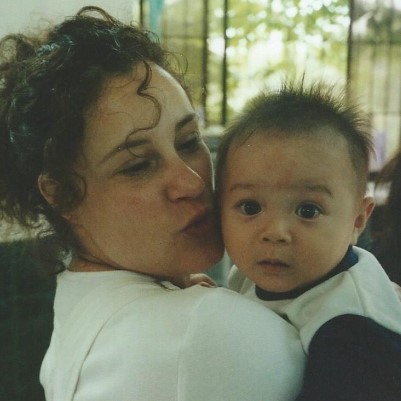 Christine Rhyner
Christine Rhyner Christine Rhyner
Christine Rhyner
I am a wife, adoptive mother, non-fiction writer, defender of human life, amateur photographer & scrapbook-maker. Christians lost the culture war. I believe this is a critical hour for each member of the church to embrace his or her identity in Christ, unite in one mind and one Spirit, and boldly share the gospel with a hurting world.

The Son Who Almost Wasn't
“In all of my experience helping to place thousands of foreign-born children with adoptive parents, I’ve never experienced such a tough set of circumstances causing so much disappointment to two families,” says Mr. Ray, our adoption director.

People say,
"It’s the journey, not the destination."
The Israelites did not think so when they wandered through the desert for forty years in search of the promised land.
How Much Did You Pay For Her?
Understanding why people say what they do is the first step toward compassion, as it allows us to glimpse another perspective. This can lead to giving others grace an undeserved gift of letting people off the hook for what they say that eventually leads us to forgive them.
In November, 2023, The Population Research Institute published an article, “Why are the Global Elites Trying to Eliminate Their Fellow Man?” It exposed wealthy climate activist, Warren Buffet, for the billions he spends to fund abortions and even sterilizations of poor women globally without their knowledge or consent. Apparently, according to elites who are a part of enacting this New World Order, most of us non-elites are both useless breeders and non-essential and redundant carbon-producing offenders.
Chris Anderson, head of the TED media group, interviewed Yuval Noah Harari, Schwab’s right-hand man. “God is dead. It’s just taking a while to bury the body,” and “the days of human beings having a soul and free will are over,” are examples of some of his unfathomable statements. As for Jesus dying on the cross to save humanity from its sin, he characterizes that as “fake news,” a natural extension of Schwab’s statement that “Salvation is found at Davos.”
In the interview, Harari stated that the elites just don’t need the vast majority of humans to exist. “We are really acquiring divine powers of creation and destruction,” Harari preened. A man who has the ear of world leaders essentially dismisses human qualities and abilities of the masses as redundant and more supremely created in a laboratory.
The extremist Climate Change agenda--or the delusion that man can save a planet--is the arrogant inverse of believing in a God Who said to go forth and multiply, Who calls children a blessing from Him, and Who sent His Son to save the people on the planet. It’s like an upside down cross, mocking Christ. It isn’t just believed by impressionable children and college students—many who live in terror of an ‘existential threat,’ but by millions of educated adults. Deception is the law of these times, by which the ruling class can gain control of the people on the planet.
Climate change is also about restricting movement. For instance, ‘fifteen-minute’ cities have been established in Britain and other countries under the guise of convenience. Within fifteen minutes of their flats, residents can supposedly work and access all essential goods and services. Of course, there are limitations on the frequency with which they may venture beyond the “check points.” The time will no doubt come when these excursions are granted “with good behavior.”
Globally, according to the World Health Organization, seventy-three million abortions are performed annually. (worldpopulationreview.com) Our current administration, including all Democrats in Congress, as well as many Republicans, are pro-abortion. We, the United States, pushed our abortion onto the world. That’s infanticide of tens of millions of human beings per year, with every strand of DNA in place for a future doctor, writer, artist or athlete.
The power puppeteers of this world can keep the population in check through future planned pandemics, ongoing wars, starvation (e.g., forcing farmers to produce less crops or kill off a third of their cows), crashing the U.S. economy or seizing all control of its healthcare. All are in the works now. But their near religious zeal for abortion as a mainstay persists.
There is a great need for international repentance and for the body of Christ to stand up and be heard. Climate change extremism and abortion aren’t politics, they are spiritual warfare with evil that always desires control. Before the devil dominates, he first manipulates and intimidates. These tactics to destroy the family and surveil and control through the climate agenda should be preached about in the pulpit as a convergence of events ushering in the anti-Christ, prayed about fervently, and taken to the streets by Christians (peaceably, of course). Oh, that our numbers should be so great, that no eighty-year-old, pro-life advocate praying near an abortion clinic will alone face mockery and disdain by the mainstream media. And no off-duty police officer and his son would be arrested for praying silently outside of a clinic, with a father thrown off the force for what amounts to thought crimes. And no swat teams bursting into homes of pro-life advocates, terrifying their young children, and handcuffing and carting Daddy off to jail.
The climate agenda puts humans, made in the image of God, beneath the dust and dirt of the earth and every other living thing on it, in lower esteem. But God’s view of us reads, “You made him a little while lower than the angels; You crowned him with glory and honor, and set him over the works of Your hands. You have put all things in subjection under his feet.” (Hebrews 2:7 &8)
God gave us dominion over the earth and everything in it. Of course, we are to be good stewards of it and care for it. But many use climate change as a reason to glorify the earth. Fervent climate change believers are like those written about in Romans 1:25: “They exchanged the truth of God for a lie, and worshipped and served the creation more than the Creator—Who is forever praised. Amen.” We are the most exquisite form of life on the planet created by God, the image and likeness of Himself.
The publication of Rachel Carson’s Silent Spring in 1962 and the ensuing rise of environmentalism in the 1960’s coincided with the start of abortion law reform. Decades have passed to the present day where an outgrowth of the environmental movement, Climate Change extremism, has become intrinsically linked with abortion. We hear modern-day climate activists espouse that killing babies and foregoing having children is good for the planet. Earth911.com states that abortion is “reproductive justice which is environmental justice. Having universal access to reproductive health services — including abortion — is good for people and nature.” Unfortunately, this dissonant messaging has been going mainstream and is becoming the war cry of many politicians and college students.
This trend is in stark contrast to the Christian worldview that families are God’s design for the human race and the bedrock foundation that holds societies together. Author and co-founder of Whole Heart Ministries, Sally Clarkson, beautifully sums up God’s intent for what society has veered far from, “Home is the foundation upon which great civilizations are built. It is the sacred dwelling where souls are forged, humans have great value, children are cherished, and marriage is regarded as holy.”
Shaming couples for having multiple children is done publicly. Not even Prince William and Kate Middleton were off limits. A children’s organization, “Having Kids,” took them to task for desiring a third child (the now four-year-old Prince Louis). Executive Director Anne Green Carter Dillard penned an open letter warning them: “Your discussion of having a larger family raises compelling issues of sustainability and equity. Large families are not sustainable." (Cambridgeshire Live, April 17, 2022)
There are young adults terrified to bring children into a world they believe will be destroyed by climate change, and there are organizations that vow to help end humanity. One of them is ‘The Voluntary Human Extinction Movement’ or VHEMT. They refer to themselves as ‘vehement,’ as in vehemently opposed to becoming mothers and fathers. Their ardent belief is that “phasing out the human species by voluntarily ceasing to breed will allow Earth’s biosphere to return to good health.” (vhemt.org)
America barely has any restraints on the slaughter of infants in the womb. Neither are there limits on how far teen girls and women will go to celebrate their abortions on social media sites and at entertainment awards shows. Even a growing number of self-proclaimed Christian abortionists say that they are doing the Lord’s work. One has said, “I feel God’s spirit and guiding hand in my work.” (The Christian Post 11/26/16) The God of the Bible says he hates the hands that shed innocent blood. (Proverbs 6:17)
Yet many of these same women weep and mourn and pump fists in protest over their belief that we only have a few years left before the planet burns up or is under water. They think this calamity can be circumvented by depopulation along with eliminating fossil fuels. Politicians, elites and celebrities alike use their platforms to paint a dire picture for the planet without urgent climate action. In a July, 2023 appearance at Coppin State University in Baltimore, Maryland, Vice President Kamala Harris called on the US to “reduce population” in an effort to combat climate change and build a “clean energy economy.” What she intended to say was reduce pollution (i.e., carbon dioxide emissions), the White House and media outlets were quick to clarify, but was heard by many as a proverbial Freudian slip of the tongue. On the contrary, the administration’s blind eye to the entry of countless millions of illegal immigrants exacerbates environmental impact and pollution -- more cars on the road and more residences to heat and cool (both of which emit “harmful” carbon dioxide), and tons of additional trash generated per year.
The current administration is in alignment with the depopulation agenda of the World Economic Forum founded by Klaus Schwab. He and other influential billionaires gather at Davos annually to advance plans of a world without fossil fuels, as well as a one-world government, economy and religion. Where the world saw death, isolation and shuttered small businesses, he saw opportunity to reset the economy and social order.
Are you one who keeps a journal? Maybe you hope to one day write a memoir or autobiography to hand down to your kids and grandkids? Nothing you'd want to publish for the world to see. Just preserving stories of faith and family history for future generations. At the 2024 VIRTUAL Write His Answer Conference, Robin Grunder will teach you how legacy writing can help you live better in the present and impact the future. Sign up for the conference today!